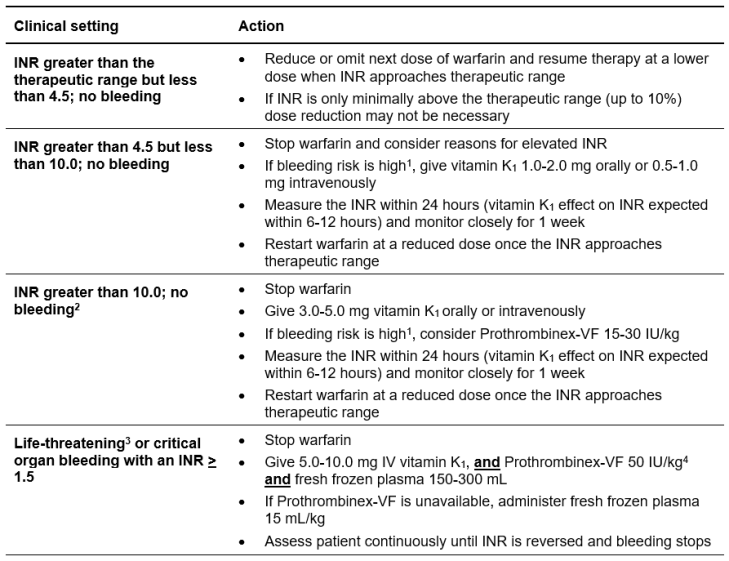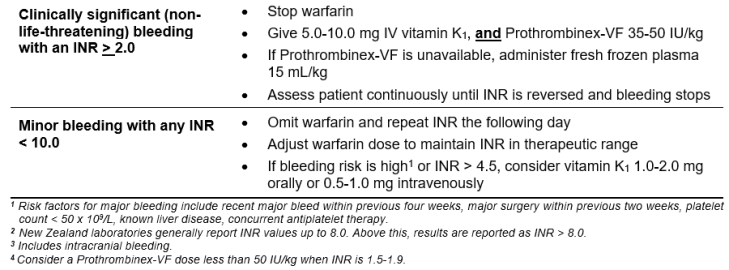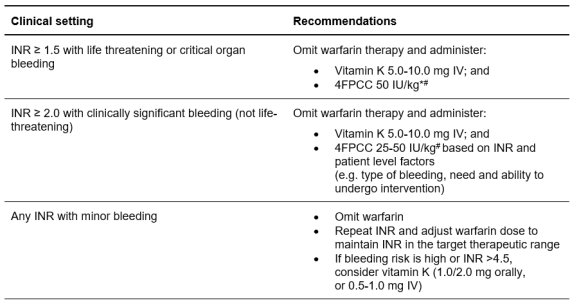Transfusion medicine
Transfusion medicine handbook
The Transfusion Medicine Handbook is designed to assist hospital staff and other health professionals in modern Transfusion Medicine Practice.
6. Special Circumstances
6.10 Oral Anticoagulant Induced Bleeding Or Overdose
Warfarin
Withholding warfarin along with the judicious use of oral vitamin K1 are the management options of choice unless rapid reversal of anticoagulation is required. Although intravenous administration of vitamin K1 produces a more rapid response (onset within 6 - 8 hours), at 24 hours both routes achieve a similar correction of INR. The intravenous route may rarely be associated with anaphylaxis. The full effect of vitamin K1 in reducing the INR takes up to 24 hours even when given in large doses.
For immediate reversal of clinically significant bleeding, treatment with human prothrombin complex concentrate (PCC) covers the period until vitamin K1 achieves full effect. Subsequent doses of vitamin K1 may be necessary for maintaining correction of the INR achieved by coagulation factor replacement. If no PCC is available, FFP should be transfused, though this is less effective and carries a significant risk of Transfusion Associated Circulatory Overload at the doses required to reverse warfarin. The FFP dose for an adult in this setting is 15 mL/kg.
The Thrombosis & Haemostasis society of Australia and New Zealand (THANZ), formerly the Australasian Society of Thrombosis and Haemostasis (ASTH) provided guidance on warfarin reversal using a 3FPCC [6] and in 2024 updated their guidelines in the setting of 4FPCC [7]
A summary for management using Prothrombinex-VF (a 3FPCC) is shown in Table 6.8; and for guidance using Beriplex NZ (a 4FPCC), please refer to Table 6.9.
Table 6.8: Managing Overdose or Bleeding in Patients on Warfarin Therapy using a Three-Factor Prothrombin Complex Concentrate


The NZBS Reversing Warfarin app developed by HealthObs Ltd, available for android and iPhone, also provides guidance for managing patients with bleeding using a 3FPCC.
Table 6.9: Managing Overdose or Bleeding in Patients on Warfarin Therapy using a Four-Factor Prothrombin Complex Concentrate

*Consider administering a 4FPCC dose < 50.0 IU/kg when INR 1.5-1.9.
# In patients > 100 kg, the dose of BERIPLEX NZ is calculated based on a capped 100 kg body weight and maximum dose of 50 IU/kg (i.e., the maximum absolute dose is 5000 IU).
Source: Updated recommendations for warfarin reversal in the setting of four-factor prothrombin complex concentrate (2024) on behalf of the Thrombosis & Haemostasis society of Australia and New Zealand (THANZ).
©The Medical Journal of Australia – reproduced with permission
The NZBS Anticoagulation Reversal webpage will provide further guidance when Beriplex NZ (4FPCC) is available in New Zealand hospitals.
Direct Oral Anticoagulants (DOAC)
There is limited clinical data on reversal of the factor Xa inhibitors rivaroxaban and apixaban. As there is no specific reversal agent available, the mainstay of current management for drug-related bleeding is withholding DOAC together with best supportive care for local control of bleeding and maintenance of haemodynamic stability. The anticoagulant effect will not be reversed by the administration of vitamin K or infusion of plasma.
Idarucizumab, a specific intravenous reversal agent for dabigatran, is available. The antibody fragment completely reverses within minutes the anticoagulant effect of dabigatran.
Guidance for the management of bleeding with DOACs has been produced by ASTH [8] and PHARMAC [9]. A joint publication from the NZ government, PHARMAC and bpac provides useful advice for dabigatran and rivaroxaban bleeding [11]. The recommendations may change as new evidence becomes available. Additionally, the Rivaroxaban app and the Dabigatran app developed by Health Obs Ltd, available for Android and iPhone, provide guidance for managing patients with bleeding.
